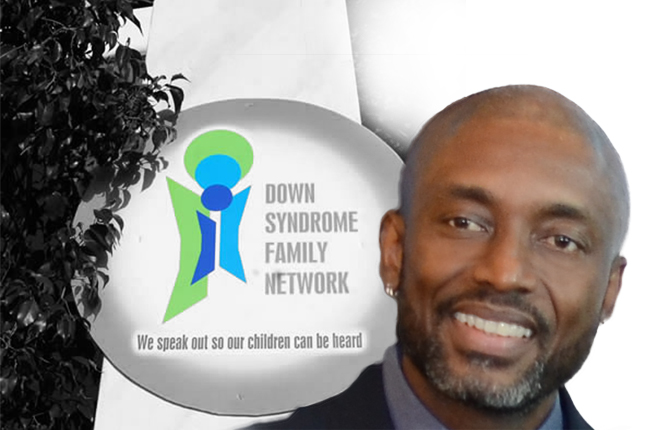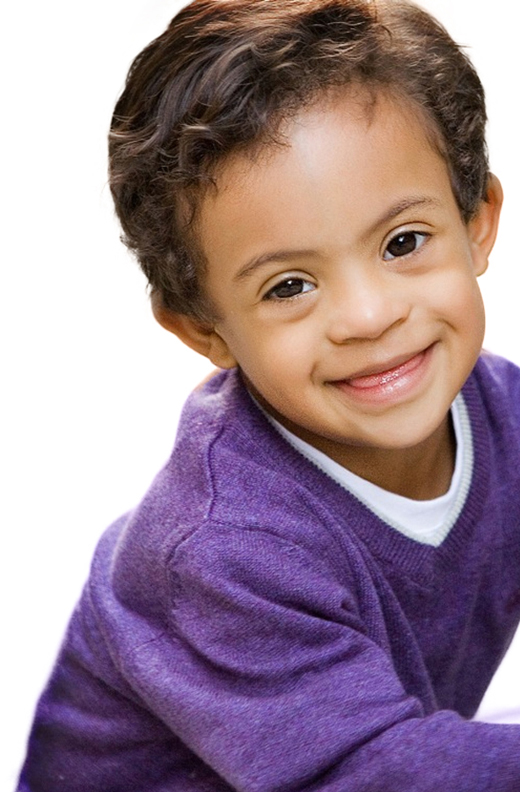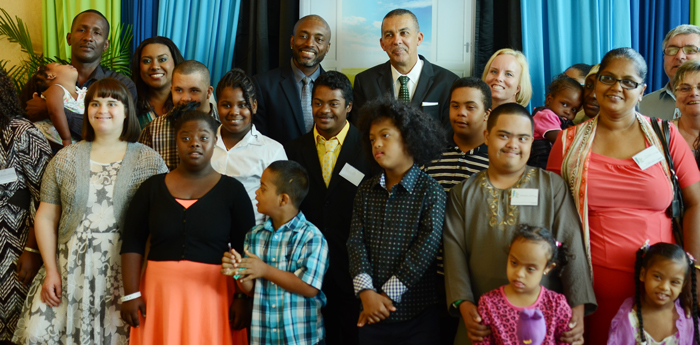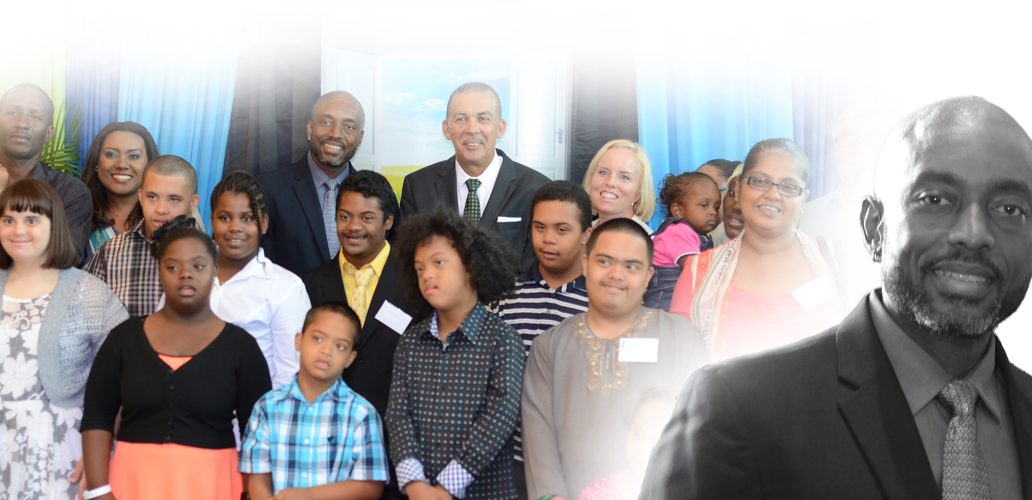Athletes David Egan and Dr. Karen Gaffney. Actors Chris Burke, Tommy Jessop, Lauren Potter, and Luke Zimmerman. Models Valentina Guerrero and Jamie Brewer.
These are only a few of the persons making history worldwide for their talents… and they have Down syndrome.
This genetic disorder and the ability to lead a successful, fulfilling life are not mutually exclusive — a fact that The Down Syndrome Family Network (DSFN) of Trinidad and Tobago continues to emphasise as they raise public awareness about Down syndrome.
Launched in 2012, the DSFN works towards providing a network in which parents or caregivers of persons with Down syndrome are able to access the resources, support and answers they need to educate and develop the full potential of these individuals throughout their lives.
Independent and successful adultsDSFN’s Executive Board consists of persons passionate about the advancement of persons with Down syndrome, and consists of Glen Niles – Chairman & Founder of DSFN, who has a son with Down syndrome; Directors Charlene Cudjoe, Natalie Morales and Joanna Gonsalves; and Secretary Cheryl Teixeira Joseph.
“We advocate for inclusion,” says Glen.
“The environment of a child born with Down syndrome will determine how high-functioning he or she becomes, and by changing the public perception of their limitations, we can help persons with Down syndrome to develop into independent and successful adults.”
Hope in Advocacy

Glen Niles founded the DSFN after being disenchanted with the lack of awareness and support mechanisms in T&T, compared to the evolving mindsets in countries such as the US, UK and Canada.
“When my son was born, I thought he wouldn’t be able to amount to much in life,” admits Glen.
The turning point was when he had the opportunity to attend the Annual Convention of the National Down Syndrome Congress in the United States.
They had to fight for these rights“I was completely blown away by that experience, and I realised that my child’s potential was limited by my own perspective,” says Glen.
“Many persons with Down syndrome attend university, get married, have children, are driving, have jobs; some even vote. But this didn’t come easily — they had to fight for these rights. Similarly, I realised I had to start something in T&T to do the same.”
Glen joined forces with others to create an open, supportive and collaborative network that connects individuals and families with much needed resources and information, ensuring that their loved ones are equipped to lead productive lives.
The Down Syndrome Family Network provides families with the tools they need to become educated and strong advocates of children and adolescents with Down syndrome.
Its services include:
- Consulting with families regarding challenging developmental and behavioural concerns in children with Down syndrome
- Providing information to families about Down syndrome
- Assisting families in locating community services and resources
- Working with families with adolescents in developing transition plans that identify health care and community resources, as necessary, for adult health and well-being
Understanding Down syndrome

Down syndrome gets its name from English physician John Langdon Down, who was the first to describe the condition as a distinct and separate entity in the nineteeth century. In the twentieth century, the work of French physician Jérôme Lejeune led to the determination that an extra partial or whole copy of chromosome 21 in human genes results in the characteristics associated with Down syndrome.
There are three (3) known types of Down syndrome.
- Trisomy 21 (Nondisjunction):
This is caused by an error in cell division that results in an embryo with 3 copies of chromosome 21 instead of the usual 2 because it fails to separate in either the sperm or egg. As the embryo develops, the extra chromosome is replicated in every cell. This is the most common kind of Down syndrome.
- Translocation:
The second most common type of Down syndrome, which occurs when chromosome 21 breaks off during cell division and attaches to another chromosome, typically chromosome 14. While the total number of chromosomes in the cells remains at 46, the presence of an extra part of chromosome 21 causes the characteristics of Down syndrome.
- Mosaicism:
This occurs when nondisjunction takes place in one but not all of the initial cell divisions after fertilisation. There is a mixture of two types of cells, some containing the usual 46 chromosomes and others containing 47. These individuals may have fewer characteristics of Down syndrome that the other types.
Down syndrome occurs in people of all races and economic status, though older women have an increased chance of having a child with Down syndrome. However, the age of the mother does not seem to be linked to the risk of translocation.
The additional copy of the 21st chromosome which causes Down syndrome can originate from either the father or the mother. Furthermore, to date, scientific research has not indicated that Down syndrome is caused by environmental factors or the parents’ activities before or during pregnancy.
Mild to moderate range
Apart from noticeable physical traits and intellectual differences, persons with Down syndrome may also suffer with health problems including thyroid disorders, leukemia and congenital heart disease.
While there is a spectrum of varying degrees of cognitive delays in persons with Down syndrome that can range from mild to severe, most persons fall in the mild to moderate range.
Read more about Down syndrome here.
Advocacy for Inclusion
With advances in speech, occupational and other therapies, alongside with evolving perceptions around the world; individuals with Down syndrome are becoming increasingly more integrated into society and organisations such as schools, health care systems, work forces, and social and recreational activities.
Their outreach efforts throughout the year include quarterly workshops, community groups, fundraising events, and awareness activities such as the Buddy Walk and ‘Lots of Socks’ campaign.It is the hope of the DSFN to encourage and engender these increased levels of inclusion in Trinidad and Tobago.
Since inception, one of the DSFN’s key events is the Down Syndrome Conference, which is held annually on or around March 21st, World Down Syndrome Day.
This year’s conference was held on March 19th at the Magdalena Grand in Tobago, and March 20th at the Hyatt Regency in Trinidad.

The conference’s keynote speaker was Canadian-born Special Olympian Janet Charchuk, a self-advocate for Down syndrome. Throughout her life, Janet was included in all activities, and attended the same school as her friends who did not have Down syndrome. At school, peer assistance groups and other forms of assistance from teachers to address her special needs enabled her to receive an education that was on par with her peers.
‘Lost in the system’“While some headway has been made throughout the past decade or two for those with physical challenges — access ramps, parking spots, accessible toilets, etc. — it is more difficult in our culture to accept those with mental challenges,” explains Glen.It is this type of inclusion that the DSFN longs for in Trinidad and Tobago.
“The natural inclination is to put those persons in a box — ‘you have Down syndrome; you should go over there to a school for people like you’. Some people believe that children will get bullied or ‘lost in the system’, but this will only be the case if we allow it to be. For those who are high-functioning and can do so, we need to put the systems in place to allow them the opportunity.”
Changing Perceptions
Glen notes that one of the greatest barriers to inclusion is misunderstanding. Through his own experience with his son, he has encountered a wide range of misperceptions.
“I have had people pull their children away from my son as if he were a leper, because they thought their child could ‘catch it’; others would give pitying looks or avert their stare,” he recalls.
‘Don’t worry, God will heal him’“I’ve had friends tell me it was a ‘forceps delivery’ that caused my son to have Down syndrome, and others comforting me with the words: ‘don’t worry, God will heal him’.”
Even with families that have a person with Down syndrome, he has faced challenges.
“Some families that are very accepting may be resistant to others’ opinions,” he explains. “Their pride, unconditional love and acceptance can mean that the person with Down syndrome might not get the chance to have therapies from an early age, or might not get the chance to interact with others outside of the family.”
He recalls an experience shared by a woman who had contacted the DSFN. Out of love and a fear of others taking advantage, their family had kept her older sister with Down syndrome ‘closed off’ from the outside world for most of her life. After their parents’ death, her older sister became her responsibility; however, she now had health problems and also had to take care of her own family — which proved difficult when her older sister with Down syndrome, now in her 30s, had never learnt the simple tasks of feeding, dressing and bathing herself.
Early intervention and integration“It is these stories that are the most heart-wrenching because they could have been avoided,” states Glen. “Both their lives could have been so drastically different, if only early intervention and integration had taken place with that family.”
He acknowledges that having a son with Down syndrome has made him even more aware of his mortality, but at the same time more motivated to put things in place for his son’s independence.
Inclusion benefits allHe notes that worldwide, there is greater acceptance for minorities in terms of race, religion and sexual preference — changes that can be attributed in part to the media. The media has also engendered greater opportunities for connection and partnering with other parts of the world, where inclusion programmes have been proven successful in producing adults with Down syndrome that have the opportunity to live normal lives.
“Inclusion benefits all,” he states. “But it is not a matter of what the school, the government, or my community is doing for me. If I do not lead the way, the changes I want may never come to pass. My child’s future is in my hands, and I have to make that future for him.”
Further Information
- Education is a key area of focus for the DSFN, and they advocate for the need for proper assessments in schools. See this link as it pertains to the concept of the “least dangerous assumption: http://www.ndsccenter.org/resources/general-information/ds-news-articles/inclusion-works-part-1
- The DSFN promotes the use of People-first language; this puts the person before the diability and eliminates old, prejudicial and hurtful descriptors. As self-advocate Janet Charchuk says: “Don’t label me, my name is Janet.”
- The “R” word – The R-word, ‘retard’ is OFFENSIVE. As Karleigh Jones, Special Olympics New Zealand athlete says: “It is considered hate speech because it offends people with intellectual and developmental disabilities, as well as the people that care for and support them. It alienates and excludes them. It also emphasises the negative stereotypes surrounding people with intellectual and developmental disabilities; the common belief that people with intellectual and developmental disabilities should be segregated, hidden away from society, which, in my opinion, is really old fashioned.”
- The DSFN is interested in partnering with like-minded organisations that have a strong belief in their cause.They are also looking to build Board capacity with persons who are passionate about their cause and interested in being lifetime volunteers; person who can serve as the voice of persons with Down syndrome and can be brand ambassadors in terms of spreading awareness and changing the language and perceptions about Down syndrome.

